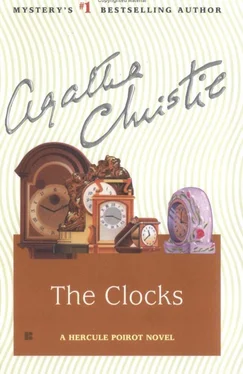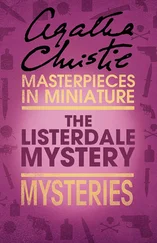Agatha Christie - The Clocks
Здесь есть возможность читать онлайн «Agatha Christie - The Clocks» весь текст электронной книги совершенно бесплатно (целиком полную версию без сокращений). В некоторых случаях можно слушать аудио, скачать через торрент в формате fb2 и присутствует краткое содержание. Год выпуска: 2004, ISBN: 2004, Издательство: Berkley, Жанр: Классический детектив, на английском языке. Описание произведения, (предисловие) а так же отзывы посетителей доступны на портале библиотеки ЛибКат.
- Название:The Clocks
- Автор:
- Издательство:Berkley
- Жанр:
- Год:2004
- ISBN:ISBN-13: 978-0425173916
- Рейтинг книги:5 / 5. Голосов: 1
-
Избранное:Добавить в избранное
- Отзывы:
-
Ваша оценка:
- 100
- 1
- 2
- 3
- 4
- 5
The Clocks: краткое содержание, описание и аннотация
Предлагаем к чтению аннотацию, описание, краткое содержание или предисловие (зависит от того, что написал сам автор книги «The Clocks»). Если вы не нашли необходимую информацию о книге — напишите в комментариях, мы постараемся отыскать её.
The Clocks — читать онлайн бесплатно полную книгу (весь текст) целиком
Ниже представлен текст книги, разбитый по страницам. Система сохранения места последней прочитанной страницы, позволяет с удобством читать онлайн бесплатно книгу «The Clocks», без необходимости каждый раз заново искать на чём Вы остановились. Поставьте закладку, и сможете в любой момент перейти на страницу, на которой закончили чтение.
Интервал:
Закладка:
Finally, the amenities and politeness having been observed, Hardcastle cleared his throat and spoke.
‘I suppose, M. Poirot,’ he said cautiously, ‘that you’ll want to see-well, the whole set-up for yourself? It won’t be exactly easy-’ He hesitated. ‘The chief constable told me to do everything I could for you. But you must appreciate that there are difficulties, questions that may be asked, objections. Still, as you have come down here specially-’
Poirot interrupted him-with a touch of coldness.
‘I came here,’ he said, ‘because of the reconstruction and decoration of my apartment in London.’
I gave a horse laugh and Poirot shot me a look of reproach.
‘M. Poirot doesn’t have to go and see things,’ I said. ‘He has always insisted that you can do it all from an arm-chair. But that’s not quite true, is it, Poirot? Or why have you come here?’
Poirot replied with dignity.
‘I said that it was not necessary to be the foxhound, the bloodhound, the tracking dog, running to and fro upon the scent. But I will admit that for the chase a dogis necessary. A retriever, my friend. A good retriever.’
He turned towards the inspector. One hand twirled his moustache in a satisfied gesture.
‘Let me tell you,’ he said, ‘that I am not like the English, obsessed with dogs. I, personally, can live without the dog. But I accept, nevertheless, your ideal of the dog. The man loves and respects his dog. He indulges him, he boasts of the intelligence and sagacity of his dog to his friends. Now figure to yourself, the opposite may also come to pass! The dog is fond of his master. He indulges that master! He, too, boasts of his master, boasts of his master’s sagacity and intelligence. And as a man will rouse himself when he does not really want to go out, and take his dog for a walk because the dog enjoys the walk so much, so will the dog endeavour to give his master what that master pines to have.
‘It was so with my kind young friend Colin here. He came to see me, not to ask for help with his own problem; that he was confident that he could solve for himself, and has, I gather, done so. No, he felt concern that I was unoccupied and lonely so he brought to me a problem that he felt would interest me and give me something to work upon. He challenged me with it-challenged me to do what I had so often told him it was possible to do-sit still in my chair and-in due course-resolve that problem. It may be, I suspect it is, that there was alittle malice, just a small harmless amount, behind that challenge. He wanted, let us say, to prove to me that it was not so easy after all. Mais oui, mon ami, it is true, that! You wanted to mock yourself at me-just a little! I do not reproach you. All I say is, you did not know your Hercule Poirot.’
He thrust out his chest and twirled his moustaches.
I looked at him and grinned affectionately.
‘All right then,’ I said. ‘Give us the answer to the problem-if you know it.’
‘But of course I know it!’
Hardcastle stared at him incredulously.
‘Are you saying you know who killed the man at 19, Wilbraham Crescent?’
‘Certainly.’
‘And also who killed Edna Brent?’
‘Of course.’
‘You know the identity of the dead man?’
‘I know who he must be.’
Hardcastle had a very doubtful expression on his face. Mindful of the chief constable, he remained polite. But there was scepticism in his voice.
‘Excuse me, M. Poirot, you claim that you know who killed three people. And why?’
‘Yes.’
‘You’ve got an open and shut case?’
‘That, no.’
‘All you mean is that you have a hunch,’ I said, unkindly.
‘I will not quarrel with you over a word, mon cher Colin. All I say is, I know!’
Hardcastle sighed.
‘But you see, M. Poirot,I have to have evidence.’
‘Naturally, but with the resources you have at your disposal, it will be possible for you, I think, to get that evidence.’
‘I’m not so sure about that.’
‘Come now, Inspector. If you know-really know -is not that the first step? Can you not, nearly always, go on from there?’
‘Not always,’ said Hardcastle with a sigh. ‘There are men walking about today who ought to be in gaol. They know it and we know it.’
‘But that is a very small percentage, is it not-’
I interrupted.
‘All right. All right.You know… Now let us know too!’
‘I perceive you are still sceptical. But first let me say this: To be sure means that when the right solution is reached, everything falls into place. You perceive that in no other way could things have happened.’
‘For the love of Mike,’ I said, ‘get on with it! I grant you all the points you’ve made.’
Poirot arranged himself comfortably in his chair and motioned to the inspector to replenish his glass.
‘One thing, mes amis, must be clearly understood. To solve any problem one must have the facts. For that one needs the dog, the dog who is a retriever, who brings the pieces one by one and lays them at-’
‘At the feet of the master,’ I said. ‘Admitted.’
‘One cannot from one’s seat in a chair solve a case solely from reading about it in a newspaper. For one’s facts must be accurate, and newspapers are seldom, if ever, accurate. They report something happened at four o’clock when it was a quarter past four, they say a man had a sister called Elizabeth when actually he had a sister-in-law called Alexandra. And so on. But in Colin here, I have a dog of remarkable ability-an ability, I may say, which has taken him far in his own career. He has always had a remarkable memory. He can repeat to you, even several days later, conversations that have taken place. He can repeat them accurately-that is, not transposing them, as nearly all of us do, to what the impression made on him was. To explain roughly-he would not say, “And at twenty past eleven the post came” instead of describing what actually happened, namely a knock on the front door and someone coming into the room with letters in their hand. All this is very important. It means that he heard what I would have heard if I had been there and seen what I would have seen.’
‘Only the poor dog hasn’t made the necessary deductions?’
‘So, as far as can be, I have the facts-I am “in the picture”. It is your war-time term, is it not? To “put one in the picture”. The thing that struck me first of all, when Colin recounted the story to me, was its highly fantastic character. Four clocks, each roughly an hour ahead of the right time, and all introduced into the house without the knowledge of the owner, or so she said. For we must never, must we, believe what we are told, until such statements have been carefully checked?’
‘Your mind works the way that mine does,’ said Hardcastle approvingly.
‘On the floor lies a dead man-a respectable-looking elderly man. Nobody knows who he is (or again so they say). In his pocket is a card bearing the name of Mr R. H. Curry, 7, Denvers Street. Metropolis Insurance Company. But there is no Metropolis Insurance Company. There is no Denvers Street and there seems to be no such person as Mr Curry. That is negative evidence, but it is evidence. We now proceed further. Apparently at about ten minutes to two a secretarial agency is rung up, a Miss Millicent Pebmarsh asks for a stenographer to be sent to 19, Wilbraham Crescent at three o’clock. It is particularly asked that a Miss Sheila Webb should be sent. Miss Webb is sent. She arrives there at a few minutes before three; goes, according to instructions, into the sitting-room, finds a dead man on the floor and rushes out of the house screaming. She rushes into the arms of a young man.’
Poirot paused and looked at me. I bowed.
Читать дальшеИнтервал:
Закладка:
Похожие книги на «The Clocks»
Представляем Вашему вниманию похожие книги на «The Clocks» списком для выбора. Мы отобрали схожую по названию и смыслу литературу в надежде предоставить читателям больше вариантов отыскать новые, интересные, ещё непрочитанные произведения.
Обсуждение, отзывы о книге «The Clocks» и просто собственные мнения читателей. Оставьте ваши комментарии, напишите, что Вы думаете о произведении, его смысле или главных героях. Укажите что конкретно понравилось, а что нет, и почему Вы так считаете.












